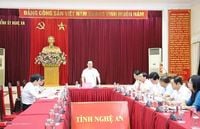In a significant event marking the approach of Vietnam's 50th anniversary of the Day of Southern Liberation and National Reunification, along with International Labor Day, the Báo Lao Động Thủ Đô and LĐLĐ huyện Đan Phượng organized a dialogue session aimed at discussing labor policies. The event, which took place on April 25, 2025, also aligns with the Month of Workers and the Month of Action on Occupational Safety and Health in 2025.
More than 300 union officials, civil servants, and laborers from Đan Phượng district participated in the program, which featured notable figures including Ông Lê Văn Thìn, Deputy Secretary of the District Party Committee, and Đinh Tuấn Anh, Deputy Editor-in-Chief of Báo Lao Động Thủ Đô. Their presence underscored the importance of this dialogue in addressing current labor issues.
During the dialogue, experts such as Thạc sĩ, luật sư Nguyễn Văn Hà and bà Vũ Minh Huyền provided insights on the new points of the revised Law on Social Insurance (BHXH) and policies for early retirement as part of organizational restructuring. Đinh Tuấn Anh opened the session by emphasizing the ongoing transformation in society, which presents both opportunities and challenges regarding labor laws.
"Today’s discussion focuses on the new aspects of the amended Social Insurance Law and the policies concerning early retirement for staff during the streamlining process. These issues deeply affect workers' rights, and it is essential that we grasp them to ensure all legitimate rights are protected," he stated.
One of the pressing questions came from Nguyễn Thị Thu Hiền of D-code Company, who inquired about the implications of her company's three-month delay in social insurance contributions on her upcoming maternity benefits. Expert Dương Thị Minh Châu responded, clarifying that if an enterprise delays social insurance payments, it will indeed affect employees' rights. To qualify for maternity benefits, employees must have contributed to social insurance for at least six months within the twelve months preceding childbirth. The 2024 Law on BHXH now includes provisions allowing employees to sue for their rights in cases of delayed payments.
Another participant, Lê Thủy Dương from Tân Hội Environment Joint Stock Company, asked about the changes in the 2024 BHXH Law that facilitate participation for freelance workers. Dương Thị Minh Châu explained that freelance workers can now register for social insurance at the BHXH agency using form TK1, and those who voluntarily contribute for at least six months in the year prior to childbirth are eligible for maternity benefits of 2 million đồng per child.
Questions regarding holiday pay were also addressed during the session. Nguyễn Văn Hà confirmed that employees working on holidays such as April 30 and May 1 are entitled to receive up to 300% of their standard wages, according to the Labor Code.
As the dialogue progressed, Nguyễn Đức Toàn from the Phùng Town Union raised concerns about the criteria for early retirement under the current streamlining policies. Vũ Minh Huyền explained that the process for considering early retirement involves voluntary applications and decisions made by competent authorities, adhering to guidelines for organizational restructuring.
Further inquiries came from Nguyễn Văn Chiến, who sought clarity on the benefits for those retiring early, particularly regarding pensions and lump-sum payments. Huyền detailed that individuals retiring early due to organizational restructuring would receive three types of allowances: a lump-sum payment equivalent to 12 months' salary, an allowance for the years worked prior to retirement, and a three-month allowance to assist in job searching.
Phí Thị Nga from Nam Hải Commercial Printing Company asked about preserving social insurance for someone who had contributed for 15 years but stopped. Dương Thị Minh Châu reassured her that employees can preserve their contribution period by closing their social insurance book, which allows them to claim benefits once they meet the retirement criteria.
As the dialogue continued, concerns about the psychological impact of streamlining on current staff were raised by Nguyễn Ngọc Long from Hồng Hà Primary School Union. Vũ Minh Huyền noted that the aim of streamlining is to enhance effectiveness and service delivery to the public. She highlighted that the Department of Internal Affairs has proposed training and job transition programs to assist those affected by the restructuring.
In response to a query about the rights of school security guards under Decree 111, Nguyễn Văn Hà reiterated that all employees must comply with the Labor Code. Specific terms regarding leave and benefits are subject to individual labor contracts, but basic rights such as annual leave must be honored.
Another participant, Nguyễn Thị Bích Hồng from ChinLanshing Rubber Hà Tây, asked about entitlements for employees with long-term illnesses under the revised BHXH Law. Dương Thị Minh Châu explained that the current regulations allow for 180 days of sick leave for long-term conditions, with changes in the new law specifying varying leave durations based on years of contribution.
Addressing concerns about fairness in the early retirement process, Nguyễn Thị Ánh from Phương Đình Commune Union asked how to prevent exploitation of the policies. Vũ Minh Huyền assured that the 178 regulation mandates transparency and public awareness in the decision-making process, ensuring that eligible workers are part of the restructuring units.
As the event drew to a close, Nguyễn Thị Hường from Tân Hội Environment Joint Stock Company inquired about the safety regulations for workers in high-risk environments. Nguyễn Văn Hà emphasized the employer's responsibility to provide a safe working environment and necessary protective equipment, while Dương Thị Minh Châu pointed out that the revised BHXH Law allows for earlier retirement for those who have contributed for 15 years.
The session concluded with a call for ongoing dialogue and adherence to labor laws, reinforcing the importance of protecting workers' rights and ensuring compliance with the new regulations. The event not only served as an informative platform for laborers but also as a means to foster understanding and cooperation between workers and management.




